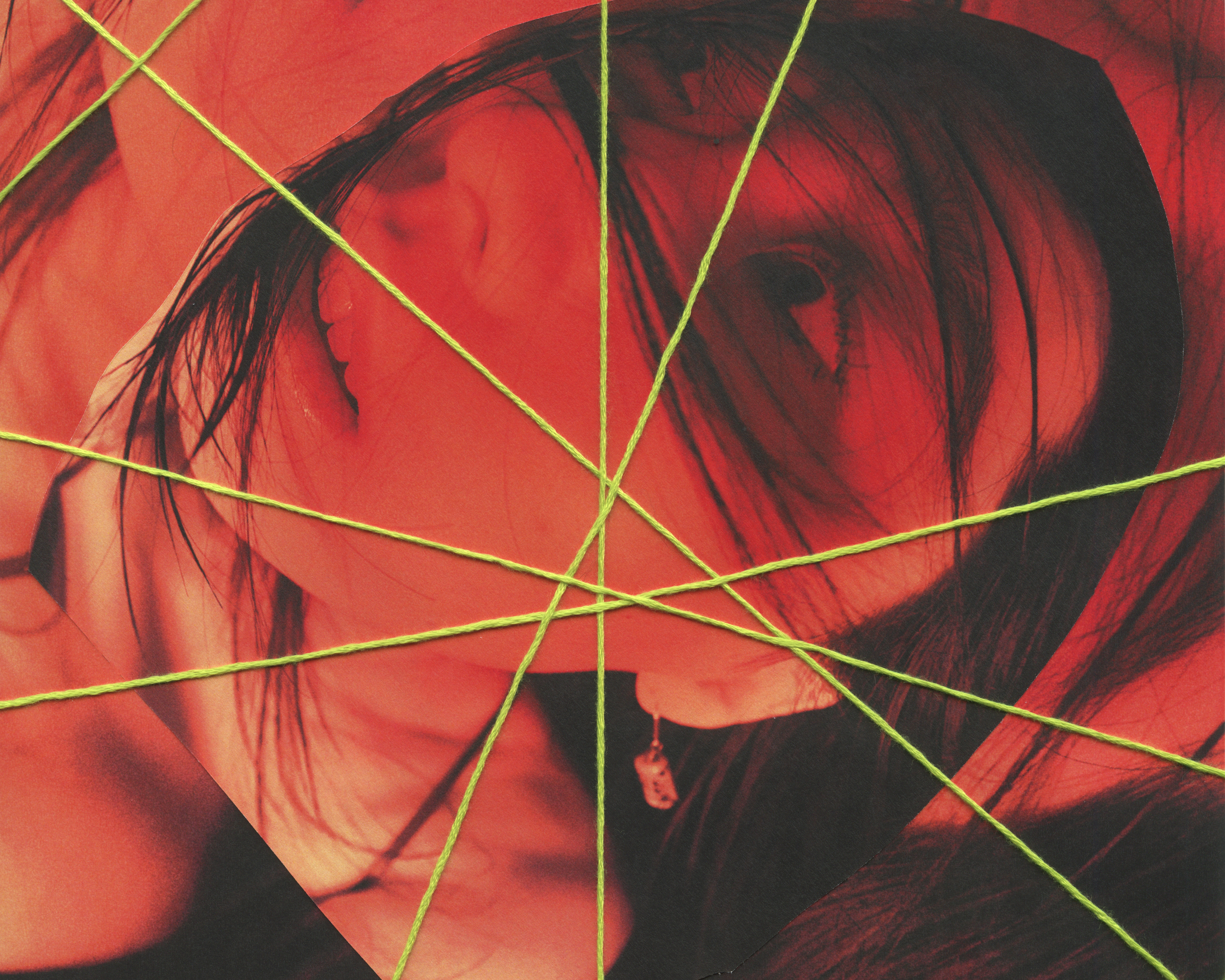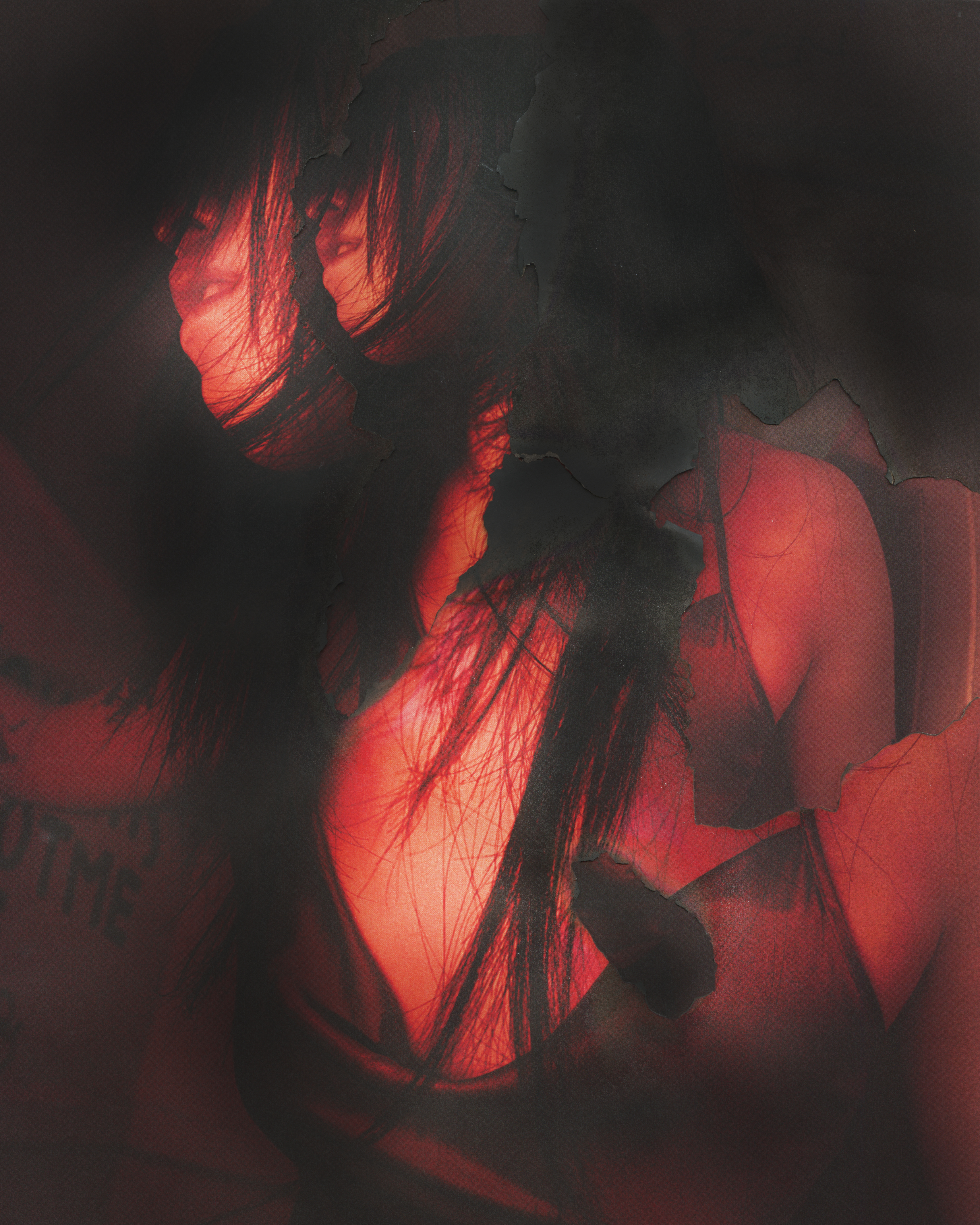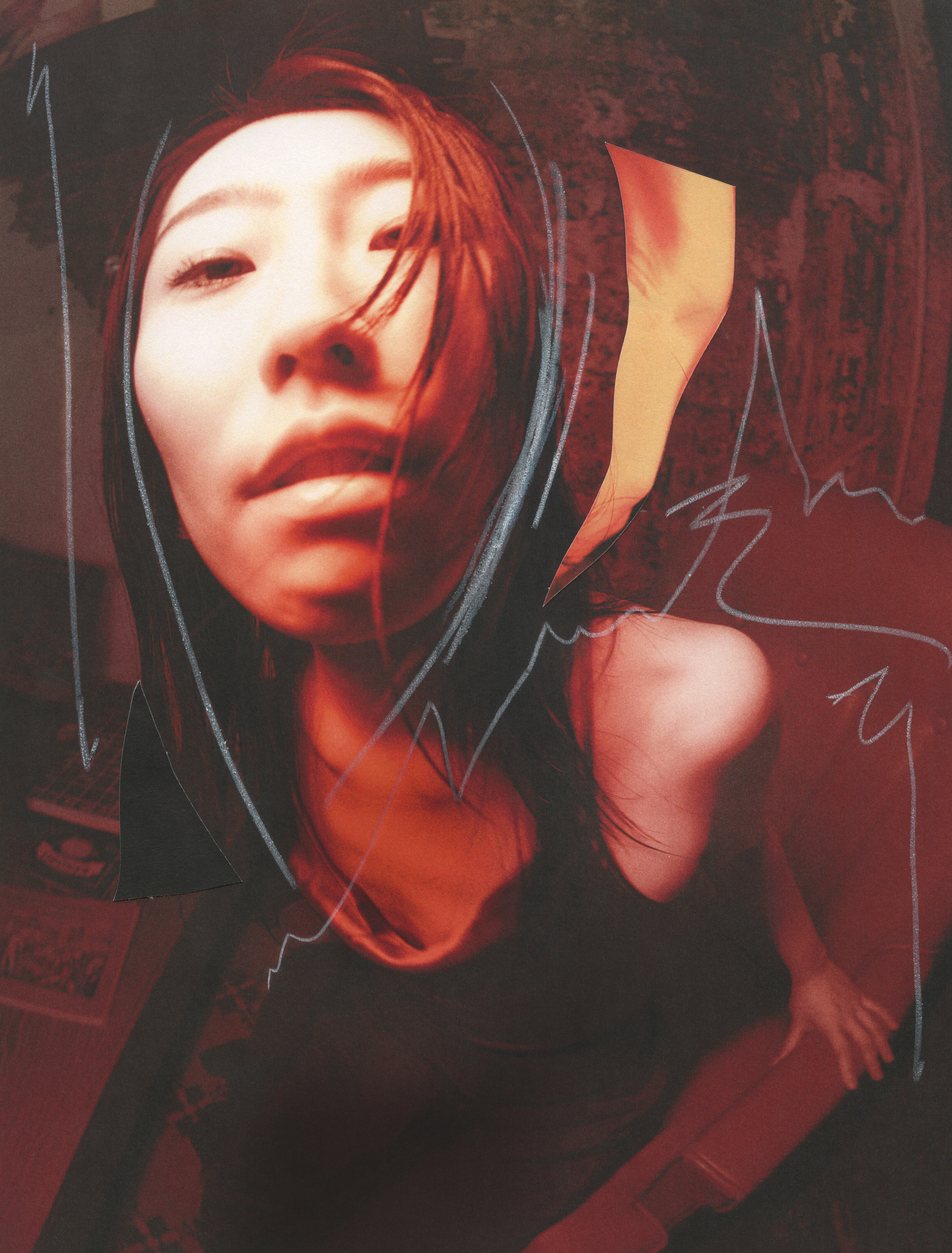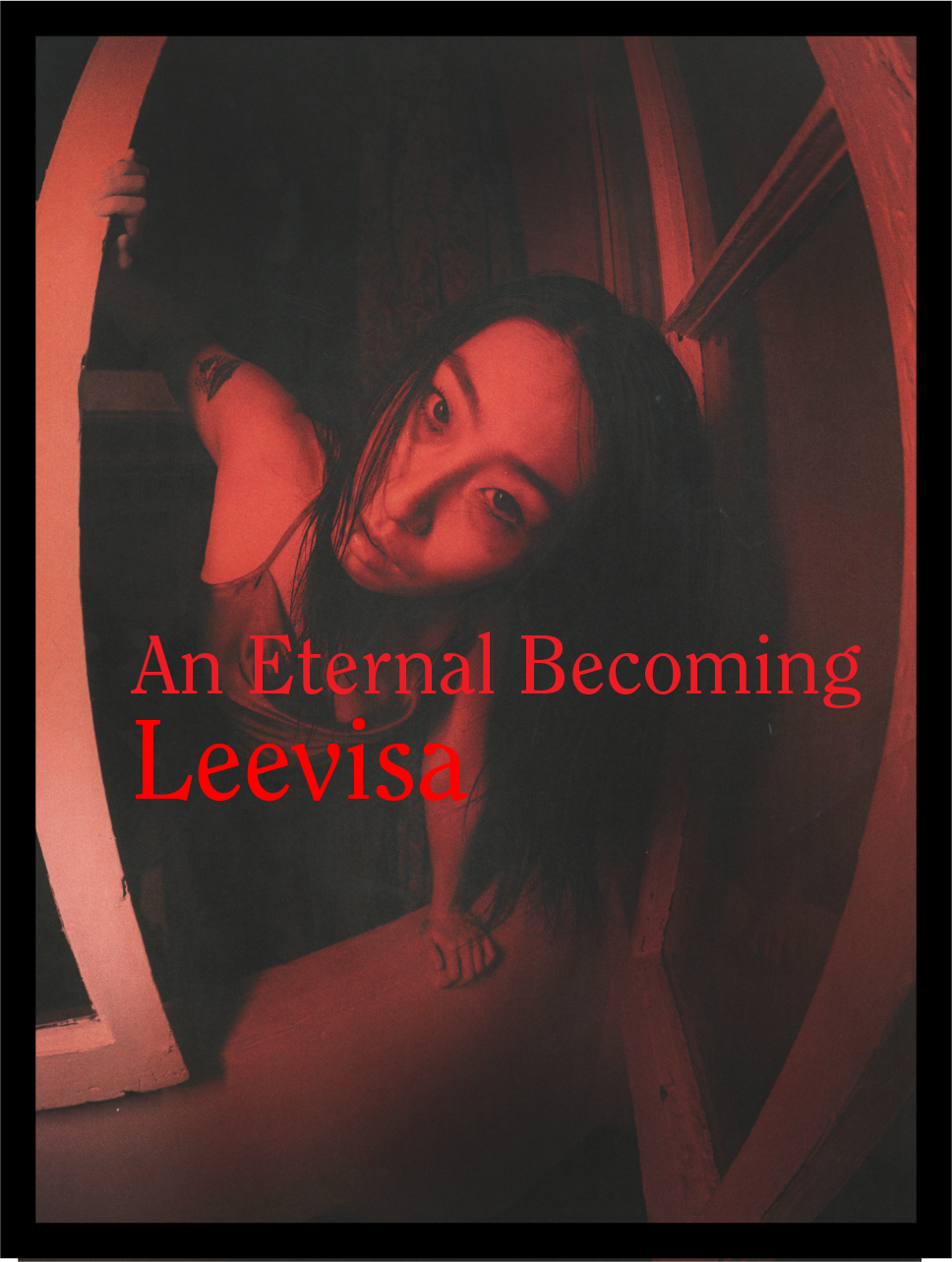AN ETERNAL
BECOMING: KOREAN ARTIST LEEVISA ON DEATH AND THE RIGHT TO BE BORN AGAIN IN HER LATEST ALBUM
KOREOGRAPHY

All images by Mary Chen
Text Edit & Intros: Renata Iberia
Interview: S(GBA)
Text Edit & Intros: Renata Iberia
Interview: S(GBA)
Only what is mortal bears life. Only in death is there rebirth.
The Balance is not a stillness. It is a movement, an eternal becoming.
–– Ursula K. Le Guin
The Balance is not a stillness. It is a movement, an eternal becoming.
–– Ursula K. Le Guin
In February 2022, Korean artist Leevisa was pronounced dead. The press release of her album Koreography, which read as an obituary, was a tender recollection of Leevisa’s life, from her childhood spent in ballet dancing to her young adult years as a design student. “Despite her hardships,” the text reads, “she lived life to the fullest… Leevisa is remembered by her friends and family.” Within this context, the album’s black and white cover sends a chill through the spectators spine. A frontal close up of Leevisa’s face suddenly feels too personal, too touched by the gloominess of death.
It might come as a confusing and relieving surprise, then, to find out that Leevisa did not actually die. Very much alive, the artist wrote her own obituary as a symbolic statement on how to radically detach from an old self. The act, she says, felt like a “meditation.” Leevisa confronted her old ways, old dogmas and old attitudes and concluded that they were simply not working anymore. By pronouncing herself dead, Leevisa makes space for a new skin, a new perspective on life through music. Past mistakes are a part of her story but they do not define her. This time, it is she who decides what it is to be free.
Koreography stands a live testament to this choice. The album, released by Ontario based label Perpetual Care, is composed of four tracks that play within the limits of IDM, club music and breaks. Compact and clean, Koreography allows the artist to dive into the concept of death not only from a place of deep reflection but also with some sarcasm and humor.
NSNS editor S(GBA) talks with Leevisa to get a hold of Koreography’s concept and find out more about the artist’s background, the current state of the Korean scene and what it means to create in times of mediatic and spiritual chaos.
*
Through the interview, Leevisa talks in a warm manner, making thoughtful pauses whenever she feels like it. She does not rush her answers or her story. Going back and forth in between Korean and English, the artist counts with the help of Joel, Perpetual Care’s founder, who is right by her side translating some of the questions for her and sharing the excitement of the album’s release as a friend would do.
S: I am really excited to talk about your new release. How do you feel about it and how has the feedback been so far?
L: (Laughs) I don’t know, I just released it but I actually feel great.
S: Would you like to tell me a bit about the connection between the label, yourself and how the album came together?
L: The first time Joel (Perpetual Care’s founder) contacted me on Instagram he said, “Hey, I want to release your album” and I replied with Koreography’s Dropbox link. The album was originally made during the end of 2019 and early 2020, so when Joel sent me a message this year I felt like the project was too painful. COVID was so difficult for me because everything was changing and I really loved playing music and performing. It was really hard for me to release something as a musician in Korea because I was supposed to have a Europe tour and a North America tour as well and it was all canceled because of the pandemic. So when Joel messaged me he wrote me a really long review and I felt glad. I thought “Oh, someone wants to listen to my music!” To be honest, I am really picky in terms of collaboration and especially with labels. I really want to work with good people, so he wrote about my album and I never experienced this kind of true attention to my music.
S: Now the press text makes a lot of sense. When I first read it and then listened to the music I thought “oh, they are making a re-release of a dead Avantgarde artist”. It didn’t sound to me that you were alive so I was looking it up, then I found you on Instagram and I realized this is a whole concept. This is a pretty brave thing, I think, to talk about your own death. You are writing about your life and how your parents remember you. Did you write it? Isn’t it hard to write that about yourself?
L: Yes, I wrote the obituary. It was a healing process. I look back to all my life and I remembered everything I have been through so far, good times and bad times as well. I never fit into Korean society. Life in Korea is sometimes very conservative and I think I’ve always looked up to something huge and free. Does it make sense? To go abroad and travel. I was a dancer of classic ballet when I was a kid and for me that was also quite a traumatic experience because it is a really hard training and I was exposed to a lot of pressure and expectations of parents. In my private life, with relationships and love, everything was quite weird to me, very controlling. It feels like I had to sacrifice for the other people… so I decided to die by releasing this album.
S: It makes a lot of sense because that’s making music and making art in your own way. As it also says in the text, you moved away from dancing and found a different channel to break free through music. Pushing your own boundaries now with creating a new album and then also going somewhere else with it. It is a fresh start creatively and artistically, I guess?
L: Yes, we are living in a flood of information with social media like Instagram and everything. As a musician, artist, choreographer or whatever, it’s really important to show how to live in this world as an artist. Artists have to suggest a good vision and inspire people. That is the whole point to me. That’s why I’m doing this, why I make art and make music.
S: So, I wanted to ask you, is it easy to write about your own death and life? Does Koreography envelop something deeper, something sociocultural, something for which you need to know the context, not just the scene of South Korea but probably also the culture in South Korea because you also speak about the conservative life and this pressure you felt to be of service to other people. It is also something important that you carry your heritage in your work, along with cultural meanings.
L: Have you ever tried to meditate?
S: Yes, I did it every day in the beginning of the pandemic. I needed it.
L: It’s just like meditation. Writing an obituary is like meditation. When you start writing the letters, it’s so painful, everything is so painful… Your past, your mistakes. It feels like everything comes back to me. When I finished the obituary I felt free. Free from my outdated thoughts and attitudes. It was like pressing the restart button. It feels great.

*
As Leevisa shares, the album is not only a declaration on freedom but also a process of coming to terms with the past. What if we gave ourselves the right to our own story, the right to our own identity? With this realization comes the responsibility of creating value as an artist and redefining the artist’s role in society. In Korea’s context, as Leevisa shares, this mission is of special importance. The country’s rigid social norms inevitably affect creative work, and it is in the hands of creatives to build pathways that lead to the liberation of self.
S: Do you think that the training in dancing taught you some discipline that is helping you now? Maybe you can take something from the past and bring it now into a new perspective and use it as a secret weapon to work with…
L: Ballet is a very conservative dance and I don't like controlling my body, training and suffering. But I am evolving, I am still learning and I am getting better and better. I want to be a better person. So training and discipline have a different meaning right now. I can use these tools in a different way right now. I don’t resist.
S: Learning to be so disciplined is also maybe part of your path in becoming a better musician. Maybe the ballet training was such a hard experience that now your musical development carries the discipline that you had for dancing, where you constantly work on yourself and become better. Just this time you know that it won’t destroy your body and you can find a way to use that experience to create music and push ideas with this hard working spirit.
L: Actually, it’s not about getting better in terms of technical development also hard working on particular projects. Becoming better artist through intensive discipline simply doesn’t mean skilled-man. For instance, I ruined my body because of lots of gigs and it wouldn’t have been resolved if I continued wax on, wax off in a musical way only. Eventually I learned how to balance between my job and real life through training.
*
After organizing a series of parties at a club back in Korea, Leevisa, who is currently based in Toronto, recognized the value in gathering and creating safe places for self-expression, especially for people of the LGBTQ+ community. However, the pandemic came and impacted her work in ways she could not expect. A whole reconfiguration needed to be done and the artist went to a place she could trust: within. Taking care of heart and mind, Leevisa started to ask herself about her voice as an artist and how her work impacted the lives of others and her own. Even though answers may not come easily, the process itself gives her the life force she needs to create music.
S: How do you navigate life currently? Now you are in Canada and you want to go back to Korea? How is the scene there? Why did you decide to go to Toronto?
L: I had pain when I lived in Korea but it doesn’t mean that I don’t like Korea. Not at all. I have a lot of affection for Korea, my mother’s country. Artists in Korea are very talented, determined and eager to do some good art. I want to go back to Korea because I miss my friends and family. On another hand, the Perpetual Care label is in Toronto and, to be honest, I really wanted to see how the label was going because he invited me to his project so I really wanted to experience it. That is why I came here.
S: So do you live there or is it just temporary?
L: Temporary.
S: Ah, I thought you moved there!
L: No, not yet. I don't know yet.
S: Could you describe a bit how the influences are in Korea? I am listening more and more to Korean artists coming to bigger labels and reading a lot of things. I have never been to South Korea so I can imagine that it is a very extreme culture in the sense of having a lot of people and being in a world that you need to understand first (I mean every world you need to understand first). What are your influences, how are the people there? How would you describe it?
L: I think my fellow artists and Korean artists really enjoy challenging themselves and expanding their potential in many ways. They really get skillful and good at making music. Before COVID, I organized a party series at a club and I invited artists from London and the USA. That way new music was presented to the audience and people learned from the parties. I also did mix series from Asia and Europe and I started an art collective under the name Free Collision. People in Korea are fast in learning everything. Art, music and so on. When I started my career it started at the club but I thought I could do more. I think dance music is more artistic. So I wanted to prove and show it can have a place within the art scene. Because the concept of club and art was quite separate but I think it is all the same.
S. And I have been reading in one of the articles in I-D I think that women and LGBTQ people are starting to have more safe spaces. And I found that also quite interesting to read because it is so conservative. How is that happening? Is it like the same space?
L: We have a queer community, DJ’s who belong to the LGBTQ community, drag queens… And yes, we are very conservative but at the same time it is very easy for people to accept something. It is beautiful. But at the same time, many audiences loves drag queen shows but when some people see a gay couple they don’t like it sadly. Before the pandemic they were getting more spaces for having shows but there was an issue during COVID at a gay club in Seoul. That was quite a hard time for the LGBTQ community to deal with that. The club had to shut down and got blamed.
L: (Interpreted by Joel). They said that these places where the queer community gathered were supposedly spreading the virus and they had to close them down.
L: But what they said was not true! At the time everyone was exposed to a risk of COVID.
S: How do you find the freedom to be yourself in that type of conservatory context? With the parties and safe spaces you are probably giving people the chance to show themselves and be who they are…
L: A lot of my friends are queer, gay and lesbians and non binary, and when we go to a party or my friends come to my party we wear what we want, we do what we want, we talk what we want. We just do it, it is just natural. We just do it and trust that someone who felt free at the party will bring other friends the next time. I think that is the community I wanted to make.
S: So it’s a big group of friends that is constantly growing because people start to know that you are hosting these parties and they bring their friends and it is starting to grow more and more and they feel like doing whatever they want to do in the club…
L: Yes, and there are amazing activists for LGBTQ rights and they also enjoy the parties, the ones I and my friends make.
S: Now, considering the pandemic, how do you think things are going to be? They are probably not the same since clubs are closing. What has changed with the pandemic for your parties? Are you waiting and trying to keep everything alive until you can bring it back?
L: To be honest, I am still figuring out all I can do. Honestly, I retired from organizing parties and I want to do something more practical, I don’t know. I am still figuring it out. What I know is that, during the pandemic, I need to check in myself and where I am so I'm just trying to take care of myself first with really basic things. When I can take care of myself, then I can take care of others.
*
Eclectic by nature, Leevisa’s sound escapes easy definition. In Koreography, each track paints a different landscape because they are built with very specific images in mind. “Avant Garde Challenge”, for example, combines the sound of metallic thumps with a playful voice and even some sneaky laughter. In contrast, “Three Shifts” comes with a heavy, muddy bass, accompanied by a beat that has the perfect speed for dancing in the club. Also, Leevisa’s love for footwork does not go unnoticed: “Indoor Labor” has a fast-moving pace and an opposition of musical textures that resemble the pulse of a city or the pulse of a busy brain. Finally, “Sori Wa Spirit” wraps up the album in a dreamy note, releasing all tension and making the heart go all soft and mellow again.
S: How would you describe your music genre wise, influences…? Because people always describe it in different ways.
L: I just want my art and my music to inspire other people, like a good speech. Basically, sound can contain a lot of emotions so it can take time to enter into their own world. Again, it’s like mediation.
S: Would you rather prefer not to have your music framed and for it to just be the “Leevisa sound”?
L: Of course I prefer not to be framed, but sometimes I need to be framed. Framing makes things easier to understand… And to be honest, I am glad Boomkat categorized my music as jungle footwork. I like that because when I started DJing, I was really into footwork and jungle at the time.
S: Yes, and every press release I’ve read on your music adds something different to it. So I was thinking maybe you have your own definition of it…
L: The music is soundtrack. I put so many thoughts and emotions into my music, and I always imagine some video in my head when I make music. I imagine the video and put some songs, background music on top of it, so it could be anything: it could be jungle, footwork, ambient, jazz, whatever.

*
S: Is there something else you would like to mention about your release and the future or the past of it?
L: Oh! I forgot to say something really important. In the past two years I’ve witnessed the death of several dear friends. This situation was really affecting me when trying to write an obituary. And there was so much regret, to be honest. They really supported my music and me, so I wanted to make something very meaningful and practical.
S: Practical?
L: Oh, probably practical has a different meaning in Korean. I mean that, at the time, my thought was: I regret I am doing music. Cause I can’t help my friends when they suffer from disease, you know what I mean. I want to make them better but I can’t. I felt hopeless about that. I decided: “from now on I am not gonna live like this.” This is something really important related to my album and the press release.
S: I am sorry to hear that. It must have been a horrible experience. Death is such a strange thing. It is an intimate experience, everyone will experience the death of someone in a different way. That’s why I find it really brave to write an obituary about oneself. I don't know if I could write my own. If I could even find the words to describe myself…
L: Yeah, that’s why this is a really personal release.
S: Do you want other people to know the story of that pain and that type of loss?
L: Yeah, this is the reason why I do this right now. I am really happy you reached out to me. I really wanted to talk.
S: We are all going through weird things in this pandemic and a lot of people have lost a lot. Careers, homes, friends, people, clubs, projects… I feel like it is also time to reveal a bit of that pain and share it.
L: Sometimes it feels like people don’t want to look fragile and vulnerable, but I think it is not bad if you can talk with honesty. We have to accept the reality we’re living in and come to terms with the fact that we need jobs, we need money, we need space. We need places again, we need to see faces, we need to see life in order to feel alive. That’s why I wanted to tell this story. To me, being honest is being brave. It is really sane. We need it. We need to be honest and be brave. And then we can support each other, we can understand each other better.
In a time where death seems to appear in every corner, Leevisa’s project invites us to define death in our own terms, to find the possibility of creating a new self in the midst of chaos. After all, if our body and our story are all we have, shouldn’t we get a say in what happens to them and how the world perceives us? With her latest release, Leevisa dives into the place where all dogmas, social expectancies and past experiences live and dares to push the restart button. Inevitably, her work asks the questions that have concerned us all during the last few years: what does it mean to be alive, and what is life worth living for? Through symbolical death, Leevisa shuts down the world’s noise and returns to a place of reflexive quietude, where death, rather than being an enemy to life, heals and informs our bodily and spiritual experience in this world.
Leevisa’s Koreography stands, above all, as a reminder: there’s always a chance to put the old self to rest and, ultimately, finally, let ourselves be born anew.
Leevisa’s Koreography stands, above all, as a reminder: there’s always a chance to put the old self to rest and, ultimately, finally, let ourselves be born anew.

